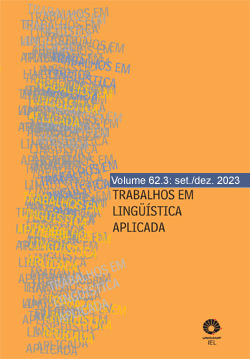Abstract
Every natural ecosystem comprises sustainable communities, which form webs of complex and self-organizing interactions. Such modes of organization of these interactions of the functioning system are objects of ecological theories. A theory of chaos and complexity is an example of an ecological theory that excludes attempts to reduce the components in part isolated and uses the paradigm of distinction-conjunction-multidimensionalization. Affordance is an ecological concept as it describes a possibility of action available in a niche for an individual. In this work, we will approach complex systems of communities of mother tongue and second language or foreign language speakers as an object to research language learning mediated by the use of digital and technological media. The methodology used was the bibliographic research of the literature about theories of chaos/complexity and affordance with application to two excerpts extracted from the research project Aprendendo com Memórias de Falantes e Aprendizes de Língua Estrangeira (AMFALE), in terms of affordances in learning linguistic. We conclude that it is possible to broaden the understanding of language learning through the ecological theoretical approach that includes pedagogical practices and electronic and digital materials in the learning process.
References
BARCELOS, Patrícia (2009). Cinema: Temas Contemporâneos: Imagens e Sons – A Construção de uma Linguagem. Salto para o Futuro: Cinema e Educação: Um Espaço em Aberto. Ano XIX, Nº 4, maio. Disponível em: <http://portaldoprofessor.mec.gov.br/storage/materiais/0000012190.pdf>. Acesso em: 01 de outubro de 2022.
BORGES, Elaine Ferreira do Vale; PAIVA, Vera Lucia Menezes de Oliveira e (2011). Por uma abordagem complexa de ensino de línguas. Linguagem & Ensino: Pelotas, v. 14, n. 2, p. 337-356, jul./dez. Disponível em: <https://periodicos.ufpel.edu.br/ojs2/index.php/rle/article/view/15396>. Acesso em: 15 de setembro de 2022.
BRAGA, Junia de Carvalho Fidelis; SOUZA, Valeska Virgínia Soares de (2016). As condições necessárias para a emergência complexa em jogos: um estudo sobre oportunidades de aprendizagem nessas práticas sociais. ReVEL – Revista Virtual de Estudos da Linguagem, v. 14, n. 26/27, p. 304-330. Disponível em: <http://www.revel.inf.br/files/4ab851b264065dffefba26631bb80845.pdf>. Acesso em: 22 de setembro de 2022.
BRANDÃO, Sílvia Figueiredo; VIEIRA, Sílvia Rodrigues (Orgs.) (2014). Ensino de gramática: descrição e uso. 2ª edição. São Paulo: Contexto.
CAPRA, Fritjof (1999). Ecoliteracy: The Challenge for Education in the Next Century. Liverpool Schumacher Lectures, March 20, 1999. Berkeley: Center for Ecoliteracy.
CORDEIRO, Alexander Magno et al (2007). Revisão sistemática: uma revisão narrativa. Revista do Colégio Brasileiro de Cirurgiões, v. 34, n. 6. Disponível em: <https://www.scielo.br/j/rcbc/a/CC6NRNtP3dKLgLPwcgmV6Gf/>. Acesso em: 30 de setembro de 2022.
DUARTE, Rosália (2002). Cinema & educação: refletindo sobre cinema e educação. Belo Horizonte: Autêntica.
GIBSON, James (1986). The ecological approach to visual perception. New Jersey; London: Lawrence Erlbaum Associates.
KUHN, Thomas S (1997). A estrutura das revoluções científicas. 5ª edição. São Paulo: Perspectiva.
MARTINS, Antônio Carlos Soares; BRAGA, Júnia de Carvalho Fidelis (2007). Caos, complexidade e linguística aplicada: diálogos transdisciplinares. Revista Brasileira de Linguística Aplicada, Belo Horizonte, v. 7, n. 2, p. 215-235. Disponível em: <https://www.scielo.br/j/rbla/a/brspjrdxNNVYDLcvmvgvZcH/>. Acesso em: 22 de setembro de 2022.
MORIN, Edgar (2007). Introdução ao pensamento complexo. 3ª edição. Porto Alegre: Sulina.
PAIVA, Cláudio Cardoso de (2008). Elementos para uma Epistemologia da Cultura Midiática. Cultura Midiática: Revista do Programa de Pós-Graduação em Comunicação da Universidade Federal da Paraíba. Ano I, N° 01, julho a dezembro. Disponível em: <https://periodicos.ufpb.br/ojs2/index.php/cm/article/view/11622>. Acesso em: 22 de setembro de 2022.
PAIVA, Vera Lucia Menezes de Oliveira e (2009). Caos, Complexidade e aquisição de segunda língua. In: PAIVA, Vera Lucia Menezes de Oliveira e; NASCIMENTO, Milton. (Org.). Sistemas adaptativos complexos: lingua(gem) e aprendizagem. Belo Horizonte: Faculdade de Letras/UFMG. p. 187-203.
PAIVA, Vera Lucia Menezes de Oliveira e (2011). Affordances for language learning beyond the classroom. In: BENSON, Phil; REINDERS, Hayo. Beyond the language classroom, p. 59-71.
PAIVA, Vera Lúcia Menezes de Oliveira e. Autonomia e complexidade. Linguagem & Ensino, Vol. 9, N. 1, 2006, p. 77-127. Disponível em: <https://periodicos.ufpel.edu.br/ojs2/index.php/rle/article/view/15628>. Acesso em: 15 de setembro de 2022.
SODRÉ, Muniz (2002). Antropológica do espelho: uma teoria da comunicação linear e em rede. Petrópolis, RJ: Vozes.
TRAVAGLIA, Luiz Carlos (2009). Gramática e interação: uma proposta para o ensino de gramática. 14ª edição. São Paulo: Cortez.
VAN LIER, Leo. The ecology of language learning: Practice to theory, theory to practice. Procedia Social and Behavioral Sciences, vol. 3, p. 2–6, 2010. Disponível em: <https://www.sciencedirect.com/science/article/pii/S1877042810013790>. Acesso em: 25 de setembro de 2022.
WALDROP, M. Mitchell (1993). Complexity: the emerging science at the edge of order and chaos. New York: Touchstone.
WORLD HEALTH ORGANIZATION (2022). WHO Coronavirus Disease (COVID-19) Dashboard. Disponível em: <https://covid19.who.int>. Acesso em: 20 de novembro de 2023.

This work is licensed under a Creative Commons Attribution 4.0 International License.
Copyright (c) 2023 Tiago Mendes de Oliveira, Geraldo Alves Lacerda


